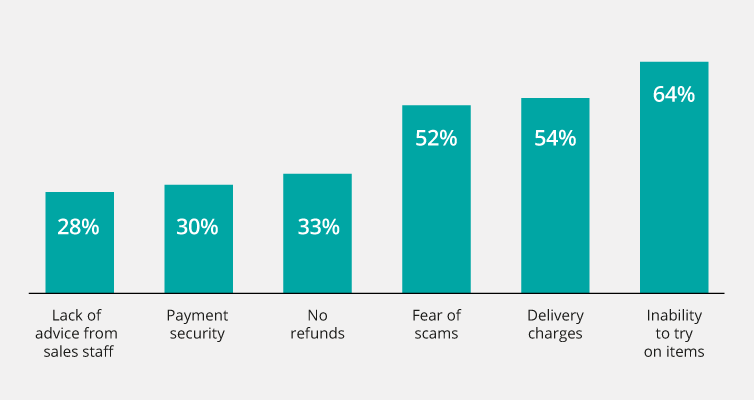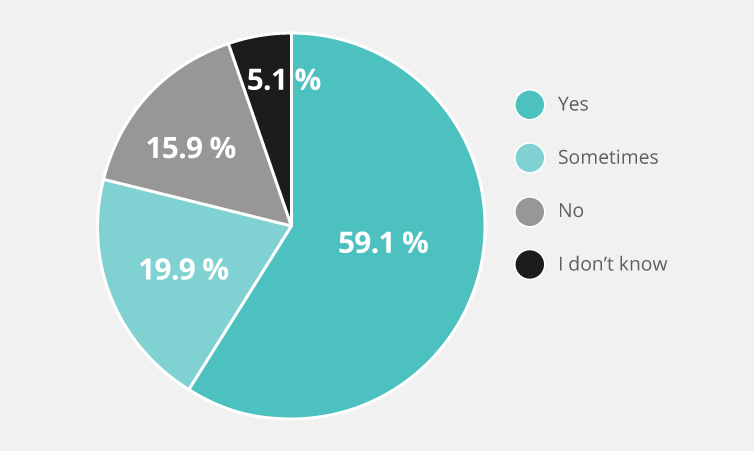10 Tips for
Earning
Consumer’s
Trust When
It Comes to
E-Commerce
Online shops are different from bricks-and-mortar stores in a million ways, but both types of business are frequented by consumers who have expectations, concerns, and hopes.
Online, you can't rely on the winning smile of your best salesperson. However, you can rely on a feeling which creates smiles: trust.
01
Provide detailed descriptions of your products
If your clients can't quickly find information on the products you sell, they simply won't buy them. Make sure that your descriptions are as thorough and objective as possible – even if it means mentioning the occasional shortcoming.
Contrary to what you might think, if you point out that your glass coffee mugs aren't dishwasher- or microwave-safe, you're actually more likely to gain customers' trust than if you say that they're the best coffee mugs on the market.
02
Post Your Security Certification
A 2012 IPSOS poll identified the six barriers to online shopping most often cited by Internet users. They included fear of being cheated (52%) and concerns about transaction security (30%).
In 2010, a study conducted by Market Research Institute GfK revealed that over 60% of customers considered security certification either "important" or "very important" when they did online shopping.
Acomba e-commerce online stores, for example, are partnered with McAfee Secure, comply with PCI DSS standards, and use a GeoTrust Premium 256-bit encryption key and a CVV2 security code. No matter what your certification is, find its logo and display it on your website.
03
Provide HD photos of your products
Would you order a product sight unseen? Unless it's an item which you've already bought several times in the past, probably not. And neither will your clients.
Make sure that your photos are of good quality – both in terms of definition (number of pixels) and of the photography itself (angle, lighting, framing, etc.).
04
Make sure your website looks professional
If you don't meet consumers' expectations, you will eventually arouse their mistrust. That's why when it comes to Web design, originality isn't always the best option.
Aim for simplicity and use colours that are in keeping with your line of business. And steer clear of Comic Sans MS font and animated GIFs.
05
Provide guarantees
Giving your customers refund and return options will reassure them significantly. Order management will be more complex, but it'll be worth the effort. Not only will you show that you have faith in the quality of your products, but by facilitating the process, you will encourage Internet users to make a purchase.
Provide further guarantees by stating the general terms of sale and indicating average delivery times. This will reassure online shoppers even more.
06
Identify yourself clearly
Consumers want to know with whom they're doing business – especially online.
Create a "Contact Us" section which contains your physical address and e-mail address or telephone number. You should also include an "About" section which allows Internet users to learn more about your company's mission, history, and activities. You can even use this section to talk about your physical sales outlets.
If you want to develop an even greater sense of trust among your clientele, you can display a photo of your CEO in the "About" section.
07
Make sure there aren't any hidden fees
If your prices aren't competitive, you might be tempted to hide certain fees (delivery, administration, VAT, transport, etc.). Fight the urge! A client who feels that he/she is being hoodwinked will not come back and will speak badly of your company.
If you charge flat-rate shipping fees or have minimum rates, you can even choose to display them immediately in the check-out cart. This demonstrates that your company is transparent, and it also prevents the disappointment which leads online consumers to abandon their carts.
08
Let users comment on your products
According to marketing specialist Dan Kennedy, "what others say about you and your product, service, or business is at least 1000 times more convincing than what you say, even if you are 2000 times more eloquent."
According to a study carried out by economic research institute ECC Handel, positive feedback increases conversion rates by 40%. Other studies compiled by French website e-commercons.com show that up to 74% of Internet users need to read at least two opinions in order to judge a product.
These results are in line with a Fittkau & Maaß study, which discovered that approximately 80% of online shoppers read customer comments before making a purchase.
09
Respect Internet users' confidentiality
You would probably really like to know how old your customers are, or how they heard about your company. However, consumers know that you don't need this information in order to sell them a product. The more you ask for more than what is strictly necessary, the less willing consumers will be to give you their personal information. Confidentiality is a very sensitive issue on the Internet.
When you ask a customer for an e-mail address, specify that you will not send him/her any advertising without his/her consent. In any case, since this summer you no longer have a choice.
10
Educate Internet users
When an enthusiastic salesperson gives you good information related to his/her product, this salesperson earns your trust and you are more liable to share this information with others.
If you post high-quality, informative content (e.g., advice on using your products), online consumers will be more inclined to choose your website. You can include this information in an FAQ or tips section – or even in a blog!
This article was originally published on September 10, 2014.

The Acomba blog is brimming with articles on business, IT and business management.
Subscribe so you don’t miss a thing!

I am already subscribed



